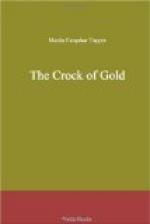But if, in doing that fell deed, madness raged upon the minutes, now that it was done—all still, all calm, all quiet, Terror held the hour-glass of Time. There lay the corpse, motionless, though coiled and cramped in the attitude of struggling agony; and the murderer gazed upon his victim with a horror most intense. Fly! fly!—he dared not stop to think: fly! fly! any whither—as you are—wait for nothing; fly! thou caitiff, for thy life! So he caught up the blood-bought spoils, and was fumbling with shaky fingers at the handle of the garden-door, when the unseen tempter whispered in his ear,
“I say, Simon, did not your aunt die of apoplexy?”
O, kind and wise suggestion! O, lightsome, tranquillizing thought! Thanks! thanks! thanks!—And if the arch fiend had revealed himself in person at the moment, Simon would have worshipped at his feet.
“But,” and as he communed with his own black heart, there needed now no devil for his prompter—“if this matter is to be believed, I must contrive a little that it may look likelier. Let me see:—yes, we must lay all tidy, and the old witch shall have died in her sleep; apoplexy! capital indeed; no tell-tales either. Well, I must set to work.”
Can mortal mind conceive that sickening office?—To face the strangled corpse, yet warm; to lift the fearful burden in his arms, and order out the heavily-yielding limbs in the ease of an innocent sleep? To arrange the bed, smooth down the tumbled coverlid, set every thing straight about the room, and erase all tokens of that dread encounter? It needed nerves of iron, a heart all stone, a cool, clear head, a strong arm, a mindful, self-protecting spirit; but all these requisites came to Simon’s aid upon the instant; frozen up with fear, his heart-strings worked that puppet-man rigidly as wires; guilt supplied a reckless energy, a wild physical power, which actuates no human frame but one saturate with crime, or madness; and in the midst of those terrific details, the murderer’s judgment was so calm and so collected, that nothing was forgotten, nothing unconsidered—unless, indeed, it were that he out-generalled himself by making all too tidy to be natural. Hence, suspicion at the inquest; for the “apoplexy” thought was really such a good one, that, but for so exact a laying out, the fat old corpse might have easily been buried without one surmise of the way she met her end. Again and again, in the history of crimes, it is seen that a “Judas hangs himself;” and albeit, as we know, the murderer has hitherto escaped detection, still his own dark hour shall arrive in its due place.
The dreadful office done, he asked himself again, or maybe took counsel of the devil (for that evil master always cheats his servants), “What shall I do with my reward, this crock—these crocks of gold? It might be easy to hide one of them, but not all; and as to leaving any behind, that I won’t do. About opening them to see which is which—”




